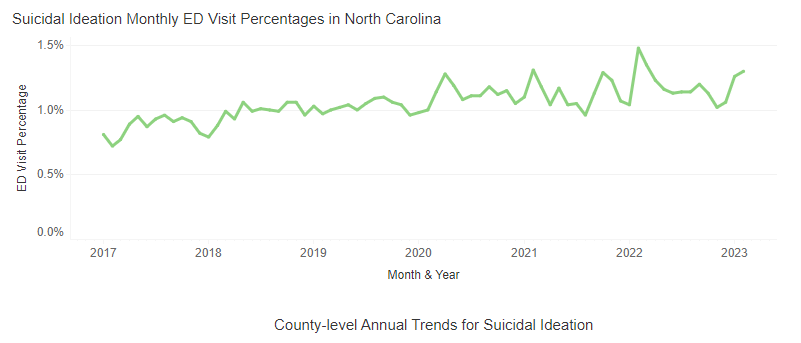by Katie Harmon
As part of an APHA/CDC funded project to incorporate data science methods into public health surveillance methods, a team from the UNC Injury Prevention Research Center characterized NC DETECT Emergency Department (ED) visits related to suicidal ideation and/or self-harm (SI/SH).
In summary, the team found the following results:
- For the period 2019-2020, there were 116,218 ED visits related to SI/SH, or approximately 159 visits per day.
- Most patients diagnosed with SI/SH were White (65%) and non-Hispanic (96%).
- While NC ED visits related to SI/SH were nearly evenly split between males (53%) and females (47%), seven out of ten suicide deaths in the ED were among males, likely due to the more frequent use of highly lethal methods (e.g., firearms) by males (Figure 1).

Figure 1. Frequency of SI/SH presentations in the ED, by sex: NC DETECT, 2019-2020
If you are interested in learning more about SI/SH NC ED visits, check out this infographic designed by Katherine Gora Combs.
If you would like to learn more about SI or self-inflicted injury trends in near real-time, take a look at NC DETECT’s Mental Health Dashboard. Using this dashboard, you can examine characteristics of SI or self-inflicted injury ED visits by selected patient and visit characteristics, including time trends. For example, did you know that the percentage of NC ED visits due to SI has increased in recent years (Figure 2)?

Figure 2. Monthly percentages of ED visits related to SI: NC DETECT, 2017-2023
Youth and young adults have experienced the largest increases in the incidence of SI. You can learn more about these trends, as well as some possible explanations in Stories from the dashboard: Emergency department visits related to suicidal ideation among North Carolinian youth.
If you have any questions about the APHA Data Science Project, infographic, or Mental Health Dashboard, please email us at ncdetect@listserv.med.unc.edu.
Disclaimer: This infographic was supported by the APHA/CDC Data Science Demonstration Project Award (2022-0007). The findings and conclusions in the document are those of the authors and do not necessarily represent the views of the APHA, CDC, or NC DPH. NC DETECT is a statewide public health syndromic surveillance system, funded by the NC Division of Public Health’s Federal Public Health Emergency Preparedness Grant and managed by the UNC-CH Department of Emergency Medicine’s Carolina Center for Health Informatics. The NC DETECT Data Oversight Committee does not take responsibility for the scientific validity or accuracy of methodology, results, statistical analyses, or conclusions presented.
